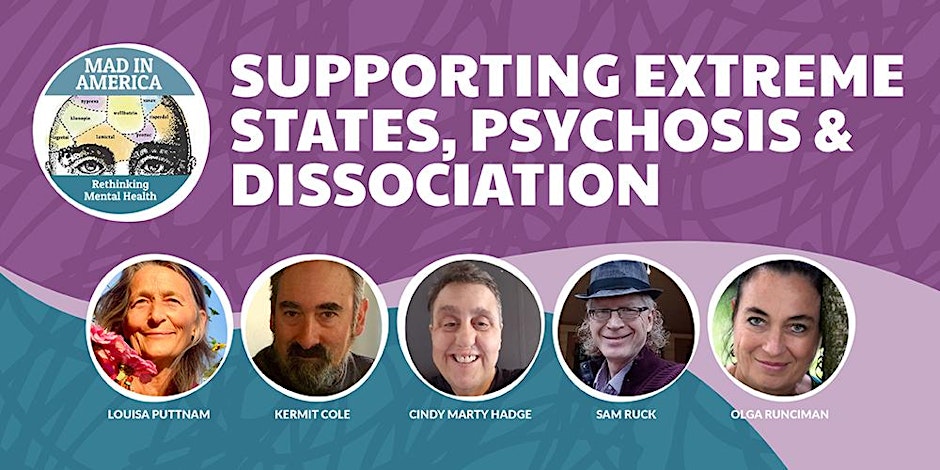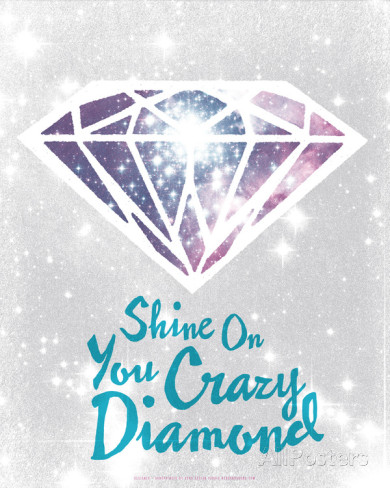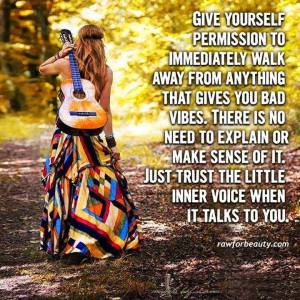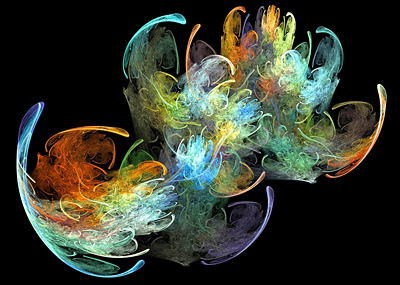Mad in America Presents a Special Panel Discussion on Saturday, March 9, 2024 at 11am PST, 2pm EST, 7pm GMT, 8pm CET

Mad in America presents a special panel discussion on understanding and supporting those experiencing extreme states, psychosis, and dissociation. Perhaps contrary to popular belief, the main focus will be how engaging and validating these states can serve as a supportive tool for healing. There will be a unique opportunity to explore the topic through the perspectives of survivors, family members, and therapists. Extensive resources will be shared, and the panel will conclude with an open audience Q&A.
Single Ticket: $10 USD. Funds will support Mad in America’s work as a non-profit organization. Not everyone can afford the expense. Please type in the code extremestates for a free ticket as needed.
GET FREE ACCESS TO EVENTS! As an alternative to buying a single ticket, you may opt to become an MIA donor for $5 USD per month or $20 USD per year. All active MIA donors receive free access to MIA events and unrestricted access to our content. Please see the MIA donate page to sign up. Once signed up as a donor, you will receive an automated email with your free event access code. You will enter this code at the Eventbrite checkout instead of a credit card.
About the Guest Speakers
Cindy Marty Hadge is a person who experienced physical, emotional, sexual, and medical trauma as a child. She experienced voices, vision, and thoughts of ending her life growing up as well. As a young adult she turned to alcohol and street drugs in an effort to make life livable. Over time she entered the mental health system, where the street drugs were replaced with prescribed drugs and the result was frequently the same – walking or stumbling through life in a mind-numbing state while continuing to experience voices, visions, and thoughts of ending her life.
Knowing that peer support in the form of 12 Step programs had been helpful while struggling with substance use, she sought out peer support for her emotional distress and experience of extreme states. Cindy discovered that she lived within walking distance of one of the Wildflower Alliance spaces, where one of the very few Hearing Voices Network groups in the US was held. Within this community she found healing and hope. By attending HVN groups she discovered that there were things she could do beyond taking medication to navigate her experience.
Cindy has found the meaning, purpose, and connection that she longed for and has made a way of making sense of the senseless. She is transforming her tragedies into treasures by being healed when creating space for others to heal. Cindy has been recognized by Inter-Voice, the international organization of HVN, for her work as an educator. Cindy is gender non-conforming and has presented both as Cindy and Marty. Cindy is a keynote speaker and a national trainer.
Olga Runcimanis the only psychologist in private practice in Denmark to specialize in extreme states (psychosis). She is an international trainer and speaker, writer, campaigner, and artist. She is a co-founder of the Danish Hearing Voices Network and the International Institute for Psychiatric Drug Withdrawal. She is a board member for a variety of organizations including Intervoice, Mad in America, The Danish Psychosocial Rehabilitation organization, and others. She has taken the three-year Finnish Open Dialogue education in London and works today as a dialogical family therapist and trainer.
For many years prior to her current career, Olga worked as a nurse in neurology and psychiatry. She also knows psychiatry from the inside, having been a patient herself. She was told she was an incurable case. Today she is in the unique position of creating a bridge between patient and professional.
Sam Ruck earned his B.A. in a Christian ministry-related field but set that dream aside when his wife began to display symptoms related to her childhood trauma early in their 35-year marriage. Together, for the past 16 years, they have learned to navigate extreme states and extreme dissociative issues, while embracing her seven “alter” identities in their relationship and family. Sam learned to become the companion his wife needed on their mutual healing journey, using strategies drawn from attachment theories and other pragmatic approaches.
Today, Sam and his wife struggle together, like many others, amidst the upheaval of culture wars and post his cancer diagnosis in 2023. They are still dealing with the remnants of her trauma and dissociation. Though his wife chooses to remain anonymous, she supports Sam sharing their learnings with significant others, family members, and anyone who is interested in a better way to engage someone experiencing mental distress. Please note that for privacy, Sam Ruck is using a pen name.
Sam blogged about their journey for a number of years later, summarizing the experience in a short book offered for free here. Excerpts have been published on MIA.
About the Hosts
Kermit Cole is a licensed Marriage & Family Therapist trained in dialogical therapies and has extensive experience working with people in psychotic states. He is a Mad in America board member and served as editor (2012 – 2014). He also faciliates the MIA US/Canada Parent Support Group.
A former film-maker, he has undergraduate and master’s degrees in psychology from Harvard. He founded the Open Paradigm film project to produce high-quality video of people and projects that question the value and validity of the DSM and its biomedical system of diagnosis. He currently tends a small urban care farm with his partner, Louisa Putnam, in New Mexico.
Louisa Putnam is a licensed family therapist, longtime meditator, and social justice activist. Having lived experience with a beloved family member, she became a Mad in America board member and facilitates its US/Canada Parent Support Group. She and Kermit Cole tend and share a small urban care farm in northern New Mexico with the community; cultivating soil, awareness, relationships, and peace.







